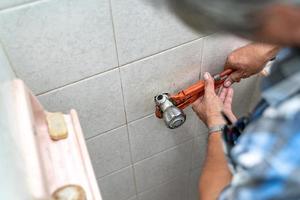What are your ideas about Plumbing Tips for New Homeowners?

For brand-new home owners, understanding and maintaining washroom plumbing can save both money and time by preventing expensive concerns down the line. Below are some essential restroom pipes pointers to assist you keep whatever running efficiently.
Familiarize Yourself with the Key Shut-Off Valve
Knowing where the major water shut-off valve is located in your house is important. This permits you to quickly shut off the water supply in case of significant leakages or throughout pipes emergencies, stopping extensive water damages.
Routinely Examine for Leaks
Small leaks can bring about big problems. Regularly check under sinks, around commodes, and near pipes components for any kind of indications of leakages. Try to find wetness, little drips, or corrosion. Catching and repairing leaks early can avoid much more severe damages and save water.
Do Not Neglect Slow Drains Pipes
If your sink or bath tub is draining pipes gradually, it's commonly an indicator of an obstruction creating. Addressing this early can prevent a total blockage. Make use of a plunger or a plumbing technician's snake to remove debris. Stay clear of utilizing chemical drainpipe cleaners as they can damage your pipes with time.
Know What Not to Flush
Bathrooms are not garbage disposals. Stay clear of flushing anything other than bathroom tissue and human waste. Products like wipes, feminine health products, and cotton swabs must be gotten rid of in the trash to stop clogs and sewer back-ups.
Set Up Strainers in Drains
Area strainers in your sink and bathtub drains to capture hair and other particles before they enter your pipes system. Cleaning up the filters on a regular basis will help protect against buildup and maintain water flowing freely.
Keep Your Hot Water Heater
Ensure your hot water heater is set to an appropriate temperature level (usually around 120 levels Fahrenheit) to avoid scalding and reduce energy usage. Flush the container yearly to remove sediment accumulation, which can lower the efficiency and life expectancy of your heater.
Update Your Components
If your home has older components, consider updating to extra effective versions. Modern toilets, showerheads, and faucets are made to use much less water while giving good pressure, which can dramatically reduce your water bill and environmental footprint.
Be Cautious with Do It Yourself Pipes Fixes
While it's alluring to handle all home fixings by yourself, beware with pipes. Some concerns might require expert proficiency, particularly if they include major water lines or sewage system repairs. Hiring a professional can often be extra cost-effective than DIY, especially if it avoids further damage.
Prepare for Winter
Secure your pipelines from cold during cold weather by protecting pipelines in unheated areas like basements, attic rooms, and garages. Throughout severe cool, allow cold water drip from taps offered by revealed pipelines to aid protect against cold.
Set Up Routine Maintenance
Take into consideration organizing yearly assessments with an accredited plumbing technician. They can identify problems that you may miss, such as hidden leakages or damage on pipelines and fixtures. Regular maintenance helps extend the life of your pipes system and can stop emergencies.
Conclusion
Understanding and keeping your home's washroom pipes can stop numerous common concerns. By adhering to these necessary ideas, you can guarantee your restroom continues to be useful and effective, saving you money and time over time.
Essential Plumbing Tips for Homeowners: Keep Your Pipes Flowing Smoothly
As a homeowner, understanding the basics of your plumbing system can save you time, money, and a lot of headaches. Plumbing issues can range from minor annoyances like dripping faucets to major problems like burst pipes that cause significant damage. This guide provides essential tips to help you maintain your plumbing system and tackle common issues.
Understanding Your Plumbing System
- Supply System: Brings fresh water into your home from a municipal source or a well.
- Drain-Waste-Vent System: Removes wastewater and vents sewer gases outside.
- Fixtures and Appliances: Includes sinks, toilets, showers, dishwashers, and washing machines.
Basic Maintenance Tips
- Regular Inspections: Periodically check for leaks, corrosion, and other signs of wear and tear. Look under sinks, around toilets, and near water heaters.
- Know Your Main Shut-Off Valve: In case of a major leak, you’ll need to shut off the water quickly. Ensure everyone in your household knows where the main shut-off valve is located.
- Prevent Frozen Pipes: In cold climates, insulate exposed pipes and let faucets drip during extreme cold to prevent freezing.
- Use Strainers: Install strainers in sinks and tubs to catch hair, food particles, and other debris that can cause clogs.
Common Plumbing Issues and Solutions
Clogged Drains:
- Prevention: Avoid pouring grease down the drain and use drain screens to catch debris.
- DIY Fix: Use a plunger or a plumbing snake to clear minor clogs. For stubborn clogs, a mixture of baking soda and vinegar can sometimes help.
Leaky Faucets:
- Prevention: Replace washers and seals regularly.
- DIY Fix: Turn off the water supply, disassemble the faucet, and replace worn parts.

Schedule
Comments on “Mastering Bathroom Plumbing: Crucial Advice for New Homeowners”